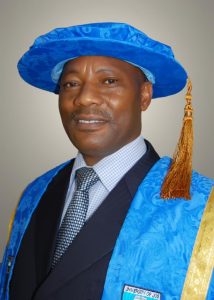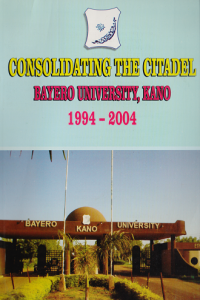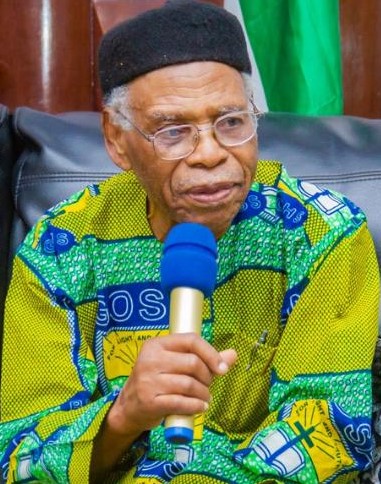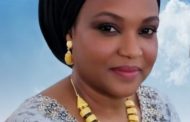There is a way that writing about someone as Prof Ochapa Onazi (ahead of his burial on September 26/27, 2024) forces up the theory of the everyday which says that the socialisation of Idoma elements into the logic of the Ten Commandments is so complete that, throughout their life, they find it nearly impossible to be action heroes in breaking any of the commandments. Puritans and protagonists of this theory, particularly someone such as the late Justice Acheme Anyebe stood by the theory throughout his life by citing how no colonial officer who worked in Idomaland ever accepted that an Idoma element could be complicit in stealing. He argued that even those Idoma elements who joined other Nigerians in the country’s corruption bazaar, for example, still take elaborate steps to conceal rather than celebrate or show off their loot because there is nothing the Idoma element fears much as shame. S/he fears shame or being shamed like nothing else.

Incumbent VC of UNIJOS, Prof Tanko Ishaya
It is a fascinating but problematic theory. It is fascinating because it can find adequate empirical demonstration from (colonial) records. But it is also problematic because it embody essentialist reasoning, with implications for supremacist attitude.
Even then, it remains a theory because theories are not about whether good or bad but about producing winners and losers. It thus remains a subject fit for further engagement itself on another day.
For now, it comes into the analytical field of play because it provides an interesting and even a more fitting frame of reference in situating Prof Ochapa Onazi’s commonly referenced exceptionalism.
Ochapa Onazi from Igumale, the railway districts axis of Idomaland, came to national limelight in 1985 when the Federal authorities appointed him the Vice-Chancellor of the University of Jos. As a campus of the University of Ibadan, the University of Jos carried and still carries its self-understanding in terms of pedigree and prestige in the comity of Second generation Nigerian universities. It doesn’t belong to the First generation but it is much older and operated at a higher stature than the Second generation universities which mostly grew from either an existing School of Basic Studies or College of Arts and Science or something like that. Only Bayero University, Kano was older than UNIJOS and existed as a senior to even the Ahmadu Bello University, Zaria. Oh yes!
Two issue areas ‘conspired’ to promote Ochapa Onazi to national limelight through that appointment. The first was the battle for a Faculty of Pharmacy for the University of Jos. Before his appointment, he was the Provost of the Makurdi campus of the University of Jos. While the mother campus in Jos was running no Pharmacy training in Jos, Onazi had a Faculty of Pharmacy in Makurdi which he now had to move with to the mother campus in Jos. But the Makurdi campus Pharmacy facility was being supervised by the University of Nigeria, Nsukka, not the mother campus in Jos. The problem was how a university which didn’t have a Faculty of Pharmacy could inherit such a faculty from a campus of its.
What this translated to for Onazi was beginning his tenure with getting approval for a Faculty of Pharmacy at the University of Jos which itself didn’t have such a faculty hitherto but had a lot from its Makurdi campus with which the new VC was coming along. Prof Onazi won both the battles as well as the war for this at all the regulatory institutions concerned at that time
The second issue area was the spatial incoherence of the University of Jos. Typical of new higher institutions in Nigeria, UNIJOS experimented with starting on a temporary site. In the case of UNIJOS, temporary site meant multiple spaces of unfolding. It was a ‘university on the wheel’, the phrase the students used to describe it in those days. It was a varsity on the wheel because it had kafteria, hostels and structures almost everywhere in the town, making the use of buses compelling or students could not meet their academic, social and extra-curricular engagements. Bauchi Road was the basement but everywhere in Jos had its own University of Jos.
According to Prof Ogoh Alubo, the UNIJOS academic who has seen a total of eight different Vice-Chancellors come and go, Prof Onazi gave UNIJOS a great image by changing the landscape. One way he did this was building the Faculty of Law. What was distinctive about that? Well, it has the biggest auditorium on the campus. Two, it was built from savings. There is something exceptional about building a faculty from savings in this context. One of the reasons that a particular Vice-Chancellor before Onazi had it rough with the university community was the perception that he was not keen in building any structure. His reply was that there was not enough cash. So, where did Onazi get cash to run the university and save enough to execute the project?
In most ratings, Prof Onazi is still the number one VC of the University of Jos who made it a university, followed by the immediate past VC, Prof Seddi Sabastian Maimako. Prof Tanko Ishaya, the incumbent is still on the job and cannot be assessed yet.

Prof Onazi was here too
Away from infrastructure, he was a promoter of moral authority. If JAMB was marked over 400, Onazi would insist the cut-off point or whatever it was called at the time cannot be less than 200. Again, this was not what is exceptional about him but implementing it even against his own daughter. Two professors testified on this about his own daughter not getting in because they didn’t hit the cut-off point.
The years Prof Onazi was Vice-Chancellor were still the testy years in terms of student-management relations. He was VC from 1985 to 1989. His approach to students’ queries was never the notion that they have nothing to fight for or that they were on campus just to pass examinations and get out. Instead, he sat down with them to explain why it was, financially, impossible to meet their demands. He wasn’t going out of his way to shut the university at the drop of the pin. Unconfirmed reports has it that he was fond of demobilizing students’ protests by joining them and ending up turning them to his side by appearing to be in solidarity with their cause.
It may not be far from the truth because he once did something that surprised observers. He appeared at the sitting of the Justice Akanbi Panel that investigated the 1986 nationwide students’ uprisings. The Federal Government had narrativised the uprising as an outcome of hijack of curriculum by lecturers who were being made to teach what they were not paid to teach. The Panel wanted to hear from Prof Onazi what he thought about that. Would he encourage the teaching of Marxism? To everyone’s shock, Onazi’s answer was, yes. The thunderous clapping for him that followed made any elaboration unnecessary.
Could this have anything to do with why Onazi never got a second term? During his time, VCs served two terms. His was not renewed. Who may know why?
It is not clear whether it is the Idoma in him or the behavioural pattern im that generation. He went into quiet life even though, as a respected administrator, he could never hide. He was made Chairman of Council of Benue State University and later that of Bayero University, Kano (BUK). He played an active role in the coming into be of the Federal University of Health Sciences at Otukpo in Benue State. Kwararafa University in Taraba State has equally benefitted from Onazi’s fertile brain. And when the Church of Christ in Nations (COCIN) decided to establish a university – Karl Kumm University, it was Prof Onazi they chose to oversee the process leading up to the realisation of the university which has taken off since 2021 in Vom, Plateau State.
The involvement with Karl Kumm University is most likely to have been his most emotionally fascinating. Why? He attended Gindiri Boys High School, one of the model schools that made Jos and its environ the pacesetter in quality schools. The brains behind Gindiri Boys High School conceptualised a Gindiri Girls High School and a teacher training college component and put all three in the Gindiri Compound. So, it was a unique experience for those who went to any of the schools, such as Prof Onazi. It was from Gindiri Boys High School in 1955 he went to the Nigerian College of Arts, Science and Technology before flying out to the University College London for a Bachelor’s Degree in 1960. Back in Nigeria in 1964, it was an automatic engagement with the Northern Ministry of Agriculture.
That didn’t last long because, according to Idomaland. Org, he left for a graduate diploma and later a MSc at Imperial College London, making him the first Idoma product of the enviable school. In 1973, he obtained a PhD from Kansas State University in the USA, the same university Prof Ango Abdullahi obtained his PhD.
In all these, nobody heard anything negative against Onazi, opening the integrity leg of his exceptionalism: to be a long runner without getting soiled.




























